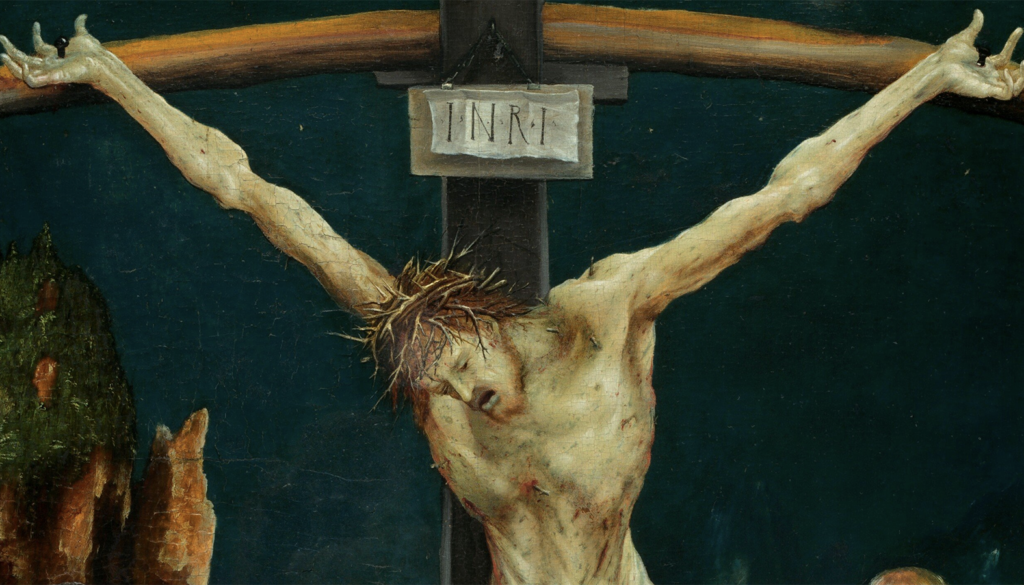The penitential season of Lent is almost finished, and Easter beckons eagerly, promising a welcome release from our privations and inviting us to bask in the golden glow of the Resurrection.
Is it any wonder that we are tempted to hurry past Golgotha, our eyes fixed firmly on the ground? Who wants to look up at the wretched derelict who hangs there, naked and blood-soaked, limbs trembling and eyes bulging, as he breathes his agonized last? We run the risk of meeting his sorrowful gaze, which even during his extremity and his despair is fixed hopefully on my face, and yours, as we go by. He cannot call our names, for he has spent his last breath offering the inexhaustible love of his mother to John, and to all men in turn. We don’t dare look. We are afraid our hearts will break.
We rush past the cross, hurried on by modern culture, which rejects the cross as an affront to our therapeutic mentality in which the aim of each day is maximizing our feelings of contentment. There is no contentment on the cross — it is a place of ultimate discomfort, of painful sacrifice and self-emptying abandonment. The cross is the negation of the ego and the ego’s prerequisites as the center of each person’s universe. It stands high there, on Calvary, and on every church spire, a sharp rebuke to the selfishness and self-regard that oils the wheels of the engines of greed, discord and mutual abasement, engines whose destination is no other place than hell.
The cross is also the place of obedience, a virtue that is more deeply unpopular today than ever. We are conditioned to think of obedience as a lack of autonomy, the surrendering of our liberty into the hands of another. Nothing could be further from the truth. Obedience is the fullest expression of freedom, in which, by aligning our wills to that of God’s, we are delivered from the strangling chains of egotism and conceit.
Stop and look up at the obedient servant, do not rush past. Look at him and remember we are meant to be ipse Christus — Christ himself. Consider that obedience was the path that Christ chose for his glorious act of redemption. Crying out in agony in the garden, as he allowed all the sins of mankind to invade and permeate him in all their stench and rankness, he asked God to take away that awful cup. And yet: “Not my will but your will be done.” To see Jesus there, obedient to the bitter end, is a reproach to you and me, who fail to see our small acts of obedience for what they really are — sanctifying and heroic — and rebel instead.
Linger there a little longer, before going on to Easter. We stand to lose too much if we make haste to leave that painful scene. We just might fail to grasp the enormity of our personal sins, those that Christ is atoning and expiating for us on that awful cross. He has climbed up there, leaden with despair, to take my place, and your place.
Yes, it is too awful to think of the weight of my offenses, and yours, added on to the enormous burden of sin and death that is crushing him to dust. But if we don’t dwell on this on our way to Easter, we will not be able to grasp the vastness of God’s mercy, and our joy won’t be complete when at last the stone is rolled back and we find the grave empty.
For when we stoop and gaze into the cool darkness, it is our experience of God’s ineffable love, unquenched even by death, that will transform us. We will learn tenderness, and mercy from him, and cry out with St. John: “We know that we have passed from death to life because we have loved one another” (1 John 3:14). Yes, even sinners like you and me will learn to love God’s lovely will, forgive the worst injustices, and endure suffering with peace.
So stop a moment or two, at the foot of Golgotha, and let your gaze rest on Christ, sweating and heaving on the cross. For the dear, green rebirth of spring means nothing if not preceded by the long leaden sleep of winter. And the triumph of the Resurrection means nothing without the agony of the crucifix and those three long days in which God lay cold and dead.

